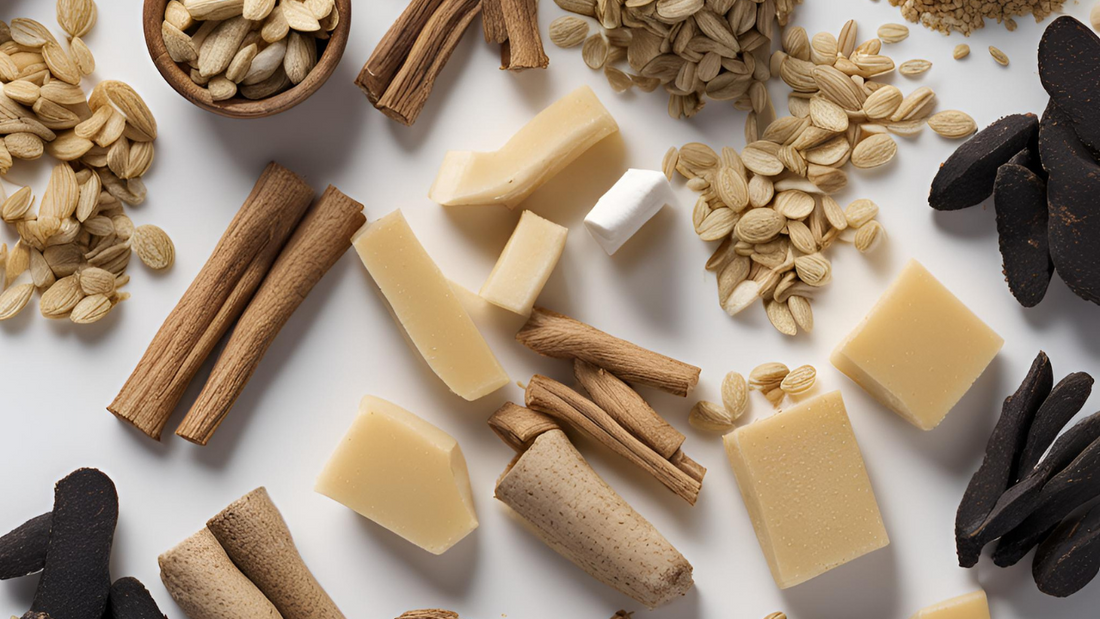Soothing Support: Exploring 10 Demulcent Herbs for Wellness

Share
What Are Demulcent Herbs?
Demulcent herbs are natural substances known for their potential to soothe irritation in mucous membranes, such as those in the mouth, throat, or digestive tract. These herbs are often rich in mucilage, a gel-like compound that forms a protective coating over tissues, helping to ease discomfort from dryness or minor irritation. This makes demulcents a popular choice for supporting respiratory, digestive, or even skin health.
Want to learn more about herbal properties? Explore our guide, “Herbal Actions: A Complete Guide to Using Herbs Effectively”.
How Do Demulcent Herbs Work?
The magic of demulcents lies in their mucilage content, which swells when mixed with water to create a slick, protective film over mucous membranes. This coating may help reduce irritation, maintain moisture, and promote comfort. For example, a cup of demulcent tea might soothe a scratchy throat, while a capsule could support digestive ease. Scientific studies suggest that mucilage-rich herbs can support tissue health, though results depend on the herb and individual response [1].
Oral Demulcents: Targeting Mouth and Throat Comfort
Oral demulcents are particularly effective for the mouth and throat, offering potential relief from dryness or minor irritation. You’ll often find them in teas, lozenges, or syrups, making them a convenient option for seasonal wellness or everyday comfort.
10 Demulcent Herbs to Support Your Wellness
Here are 10 well-known demulcent herbs, celebrated for their soothing properties and supported by traditional use and emerging research. Always follow recommended dosages and consult a healthcare professional, as some herbs may interact with medications or have side effects.
1. Marshmallow Root (Althaea officinalis)
Marshmallow root is a mucilage powerhouse, potentially soothing respiratory and digestive tissues. Research suggests it may help ease dry coughs or minor stomach irritation by supporting healthy mucous membranes [2]. Topically, it can hydrate dry or irritated skin.
How to Use: Brew as a tea or take in capsule form, following package instructions.
Note: May interact with certain medications; consult your doctor.
2. Slippery Elm (Ulmus rubra)
Slippery elm bark’s mucilage creates a gel-like coating, which may support comfort in the mouth, throat, and digestive tract. Studies indicate it could help with occasional acid reflux or minor digestive discomfort [3]. Its nutrients may also aid recovery during illness.
How to Use: Mix powdered bark with water or enjoy in lozenges.
Note: Use sustainably sourced slippery elm to protect this at-risk species.
3. Licorice Root (Glycyrrhiza glabra)
Licorice root offers soothing and anti-inflammatory properties, potentially supporting throat and stomach comfort. Research shows it may help maintain healthy esophageal and gastric tissues [4]. Use cautiously, as prolonged use can affect blood pressure or potassium levels.
How to Use: Sip as a tea for short-term use, unless advised by a healthcare provider.
Note: Avoid if you have hypertension or are pregnant.
4. Plantain Leaf (Plantago major)
Plantain’s mucilage and anti-inflammatory compounds may ease minor throat or stomach irritation, supporting respiratory and digestive health [5]. Topically, it’s a go-to for soothing skin discomfort from bites or burns.
How to Use: Brew as a tea or apply as a poultice.
Note: Generally safe but confirm with a professional if you’re on medications.
5. Mullein (Verbascum thapsus)
Mullein’s leaves and flowers may soothe respiratory tissues, potentially easing discomfort from dry or irritated coughs. Studies suggest it supports mucus clearance [6].
Product Spotlight: Try our Lung Clear & Support Tonic (#), featuring mullein to promote respiratory wellness
How to Use: Enjoy mullein tea for throat relief.
6. Fenugreek (Trigonella foenum-graecum)
Fenugreek seeds’ mucilage may support digestive comfort, potentially easing occasional heartburn. Research also highlights its role in supporting lactation for nursing mothers [7].
Product Spotlight: Our Endocrine Cleanse & Support Tonic (#) includes fenugreek for holistic wellness
How to Use: Add ground seeds to smoothies or brew as tea.
7. Flaxseed (Linum usitatissimum)
Flaxseed’s mucilage and omega-3 fatty acids may support digestive health and reduce minor irritation. Studies link it to heart health benefits, like improved cholesterol levels [8].
How to Use: Grind seeds and add to oatmeal, smoothies, or baked goods.
Note: Store ground flaxseed in the fridge to preserve freshness.
8. Irish Moss (Chondrus crispus)
This seaweed’s gel-like texture may coat the stomach lining, supporting digestive comfort. Its iodine content also promotes thyroid health [9].
How to Use: Add to soups or use as a thickener in recipes.
Note: Monitor iodine intake if you have thyroid conditions.
9. Oatmeal (Avena sativa)
Oatmeal’s beta-glucans may soothe the digestive tract, offering comfort for minor irritation. Topically, it’s a time-tested remedy for itchy or irritated skin [10].
How to Use: Enjoy as a warm breakfast or add to a bath for skin relief.
Note: Opt for plain, unsweetened oatmeal for maximum benefits.
10. Aloe Vera (Aloe barbadensis miller)
Aloe vera gel may support digestive and esophageal comfort, potentially easing occasional heartburn. Externally, it’s widely used to soothe skin irritation [11].
How to Use: Consume pure aloe gel internally (under professional guidance) or apply topically.
Note: Internal use may cause digestive upset in some; start with small amounts.
How to Incorporate Demulcent Herbs Safely
Demulcent herbs can be enjoyed in various forms—teas, capsules, lozenges, or topical applications. Here are some tips for safe use:
-
Start Small: Test a small amount to ensure you don’t have allergies or sensitivities.
-
Follow Guidelines: Stick to recommended dosages on product labels or consult a herbalist.
-
Check Interactions: Some herbs (e.g., licorice root) may interact with medications or conditions.
-
Source Wisely: Choose high-quality, sustainably sourced herbs from reputable brands like Zuma Nutrition.
